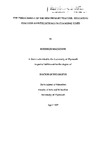Predicament of the new primary teacher : educating teachers as intellectuals in changing times
| dc.contributor.supervisor | Hannan, Andrew | |
| dc.contributor.author | Mackenzie, Roderick | |
| dc.contributor.other | Plymouth Institute of Education | en_US |
| dc.date.accessioned | 2011-05-12T13:15:29Z | |
| dc.date.accessioned | 2011-09-26T13:12:42Z | |
| dc.date.available | 2011-05-12T13:15:29Z | |
| dc.date.available | 2011-09-26T13:12:42Z | |
| dc.date.issued | 1997 | |
| dc.identifier | Not available | en_US |
| dc.identifier.uri | http://hdl.handle.net/10026.1/428 | |
| dc.description | This is a digitised version of a thesis that was deposited in the University Library. If you are the author and you have a query about this item please contact PEARL Admin (pearladmin@plymouth.ac.uk) | |
| dc.description | Metadata merged with duplicate record (http://hdl.handle.net/10026.1/694) on 20.12.2016 by CS (TIS). | |
| dc.description.abstract |
This thesis is based on a case study of the predicament of new primary teachers in a time of rapid and multiple change. It examines the proposal that emerging teachers should be supported as intellectuals in responding to the inherited collision of education policy and practice within postmodernity. Action research methodology was employed to investigate a small scale attempt to support student teachers as intellectuals in their final period of the BEd. Some participants were followed into the first year of teaching, using an ethnographic and autoethnographic methodology to evaluate and elaborate the initial proposal. The study shows that emerging teachers could function as intellectuals but there was little political or professional support for this. In particular there were neglected elements in both preparation and induction periods concerning professional purpose, vocation and orientation. The study contributes to our understanding of the dilemmas of tutoring emerging teachers as intellectuals. It also contributes to our understanding of the predicament of new teachers, which is typified as caught between the rock of the state and the increasingly hard place of the school. In this situation clarity of ideals and beliefs are required, and personal and social strategies are needed to carry these through in the problematic contexts of both policy and practice. It is recommended that the imbalance of preparation and induction programmes is reconsidered in order to allow for these neglected elements. Finall y the study offers a cultural rationale for professional purpose and vocation based on principles of equality, quality, diversity and democracy. | en_US |
| dc.description.sponsorship | University of Plymouth | en_US |
| dc.language.iso | en | en_US |
| dc.publisher | University of Plymouth | en_US |
| dc.subject | Teacher education | en_US |
| dc.subject | Primary education | |
| dc.subject | Education policy | |
| dc.title | Predicament of the new primary teacher : educating teachers as intellectuals in changing times | en_US |
| dc.type | Thesis | |
| dc.identifier.doi | http://dx.doi.org/10.24382/4079 | |
| dc.identifier.doi | http://dx.doi.org/10.24382/4079 |
Files in this item
This item appears in the following Collection(s)
-
01 Research Theses Main Collection
Research Theses Main


